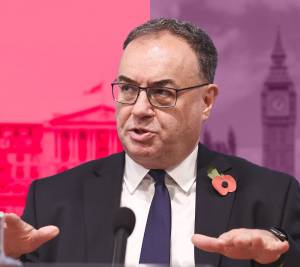Knowing how to create a money management budget will help you to be one step ahead of bills, pay off debts, and, should you have any disposable income left over, will help you set aside some savings – especially if you use a good budget tracker. This Moneyfarm blog has been written with all that in mind. To find out more, please read on.
| 🤔 What is the best way to manage money? | Budget, save, invest, and set financial goals. |
| 🧑💼 Who can help me learn how to manage my money better? | Money managers and financial advisors |
| 🆚 Should I save my money or clear my debts? | Try to should do both, but the emphasis should be on clearing your debt |
| 🔥 How do I make a budget? | Track all expenses and income, then create a budget to cut spending |
Times haven’t been this tough moneywise for a long time. But given how the UK is responding to the cost of living crisis, it shouldn’t last too long. In the meantime, finding the best way of managing your money has never been important.
According to a research briefing published by the UK House of Commons Library, the current cost of living crisis began in early 2021. Exacerbated by government support spending on coming out of the CIVD-19 pandemic, the Russian invasion of Ukraine, and escalating fuel and energy prices, inflation reached 11.1% in October 2022 – a 41-year high.
The Bank of England says that inflation should start falling rapidly around the middle of 2023 and ought to continue to go down, ending the year somewhere around the 5.2% mark. In the meantime, you need to get the best out of your money.
How to set up a budget
Setting up a budget is the first step towards getting personal money management under control. Thankfully it’s not rocket science. However, it entails collecting all the details relating to your income and expenses in one place.
Although not strictly speaking, a budget – is more of a broader “manage my money” guideline, and the “80 10 10” and “50 30 20” principles are two rules to which some people turn to.
The 80 10 10 and 50 30 20 principles
The first is the 80-10-10 rule. With this, you allocate 80% of your income to your living expenses, 10% to gifting (charities, etc.), and 10% to savings or investments.
The 50-30-20 rule involves allocating 50% of your income to essentials, 30% to your wants, and 20% to debts and savings or investments.
Whether you adopt these principles or go down your own money management route, the most important starting place is to catalogue your income and expenses as accurately as possible, using wage receipts, bank statements and bills.
If you’d like some help to get you underway, there is a free “work out your budget” tool on the Citizens Advice website.
However, creating a budget isn’t the be-all and end-all. Having a sound money management worksheet or budget tracker to track your performance against budget is essential, as is being ready to adjust your budget according to current circumstances. The moneymanagerex.org website offers some interesting software that you might find of interest.
Getting your budget back on track
It’s essential to keep to your budget once it has been created. Okay, that might sound easier than it is, given the current cost of living crisis. But that’s what sound money management is all about. If it’s not your forte, you might need the services of a good personal finance manager.
The Times Money Mentor website recently published its “20 simple ways to save money.” Take a peek. There are a few helpful ideas you might consider adopting.
Try out the 30-day money rule
You could benefit from the 30-day money rule if you are prone to impulse buying. Next time you feel the urge to spend money on an item, instead of buying the item in question, put the money into a savings account. Then, after 30 days, review your feelings about the impulse. It will probably have passed, and in the meantime, your savings will have benefited.
Paying off loans and credit cards
Any form of debt costs you money in terms of interest, and some debts are worse than others. For example, credit card debt can be very costly, whereas mortgage costs considerably less in terms of interest rates, albeit the sums involved are higher and the repayment timescales longer.
The best way to manage money is to eliminate any debt immediately. It will free up cash that can be used to help pay for your cost-of-living expenses, and any surplus you might have left over can then be invested.
Having created a budget, you should know how much you can set aside to save or invest.
Set a savings goal
Saving for the future is essential. You must do so to prepare for unforeseen emergencies or life’s important events. When it comes to money management, setting goals is fundamental, and you need to take everything into account. Researching the answers to questions such as “how much does it cost to get married” and “how much does it cost to raise a child in the UK” can alert you to some alarming numbers.
When it comes to money management and setting savings goals, it’s important to set realistic ones. Unachievable goals can be very disheartening and can lead you to derail from your budget faster. When setting your financial goals, you should also review your short- and long-term needs. It’s a fundamental aspect of sound financial planning.
Developing an investment strategy
Looking after your personal finance by creating a budget and cutting back on spending money should mean you can save money, which brings us nicely to the subject of money management in terms of developing an investment strategy.
Investing rather than saving has the potential for much larger returns. However, you must never lose sight of the fact that the value of your investments can rise or fall. So, learning how to invest money wisely is essential, and one of the ways of minimising risk is to develop a diversified investment portfolio.
Opening a general investment account is one possibility. As with any investment, it still carries risk, but it does give you the opportunity to have a diversified portfolio that caters for both your short- and long-term financial needs.
Choosing a trustworthy wealth management specialist to provide you with the sort of information a personal finance manager might offer is no easy thing. But the fact that we here at Moneyfarm are considered to be one of the largest asset manager sites, with over £2 billion worth of assets under our management, may give you some confidence.
FAQ
What is money management?
Money management refers to the process of tracking financial records and planning finances deliberately and strategically to achieve financial goals and maintain financial security. Money management can include creating a budget, setting financial goals, saving for emergencies and retirement, investing in stocks, bonds, or other assets, and making informed decisions about spending and borrowing.
Why is money management important?
Money management is important as it can help you achieve financial goals (setting objectives, prioritising and creating a plan), financial security (ensuring expenses are covered and investments and saving for retirement are made wisely), manage debt (creating a budget and sticking to it), build wealth (investing money in assets), and reduce stress from financial uncertainty.
How can I create a financial plan and set financial goals for myself?
Several steps are involved in creating a financial plan and setting financial goals. They include assessing your current financial situation, setting clear and specific financial goals, creating a plan to achieve your goals, reviewing and adjusting your plan as needed, and seeking professional help when necessary.
*As with all investing, financial instruments involve inherent risks, including loss of capital, market fluctuations and liquidity risk. Past performance is no guarantee of future results. It is important to consider your risk tolerance and investment objectives before proceeding.





